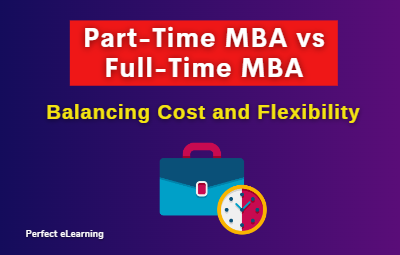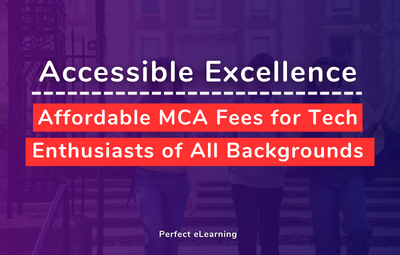

In today's competitive job market, having a Master of Business Administration (MBA) degree can provide a significant advantage when it comes to career growth and opportunities. However, deciding between a part-time MBA and a full-time MBA can be a daunting task.
Understanding the MBA Degree
What is an MBA?
An MBA is a postgraduate degree that equips individuals with the knowledge and skills required to excel in the business world. It covers a wide range of subjects such as finance, marketing, operations, and management, providing a holistic understanding of business practices.
Benefits of pursuing an MBA
Obtaining an MBA can open doors to higher-paying job positions, enhance leadership capabilities, and provide valuable networking opportunities. It can also equip individuals with critical thinking and problem-solving skills necessary for tackling complex business challenges.
Importance of choosing the right MBA program
Selecting the right MBA program is vital as it directly impacts the quality of education, networking opportunities, and career prospects. Factors such as program reputation, faculty expertise, and curriculum should be carefully evaluated before making a decision.
Exploring Part-Time MBA Programs
Advantages of part-time MBA
A part-time MBA program offers several benefits, making it an attractive option for individuals who wish to balance their studies with work and personal commitments. Some advantages include:
Flexibility in scheduling:
Part-time MBA programs often provide flexibility in terms of class schedules, allowing students to attend classes in the evenings or weekends. This flexibility enables working professionals to pursue an MBA without leaving their jobs.
Balancing work and studies:
By opting for a part-time MBA, individuals can continue working while acquiring new skills and knowledge. This can lead to immediate practical application of concepts learned in the classroom, enhancing the learning experience.
Networking opportunities:
Part-time MBA programs often attract professionals from diverse industries and backgrounds. This creates a valuable networking environment where students can learn from each other's experiences and establish meaningful connections.
Weighing the Benefits of Full-Time MBA
Immersive learning experience:
Full-time MBA programs offer an immersive learning experience as students can dedicate their entire time to study. This allows for a deep dive into the curriculum, fostering a comprehensive understanding of business concepts.
Access to resources and faculty:
Full-time MBA students typically have access to extensive resources, including state-of-the-art libraries, research databases, and renowned faculty members. The availability of such resources can enhance the overall learning experience.
Internship and career opportunities:
Full-time MBA programs often include internship opportunities, providing practical exposure and allowing students to apply their knowledge in real-world business settings. These internships can be stepping stones to securing future job positions.
Potential for higher salary and job prospects:
Completing a full-time MBA can lead to higher salary prospects and better job opportunities, especially in competitive industries. Employers often value the intensive and immersive nature of full-time programs, considering them as indicators of commitment and dedication.
Factors to Consider:
Cost and Affordability:
Tuition fees for part-time and full-time MBA programs:
Part-time MBA programs generally have lower tuition fees compared to full-time programs. This can make them more financially accessible for individuals who are unable to commit to full-time study.
Scholarships and financial aid options:
Both part-time and full-time MBA programs may offer scholarships and financial aid opportunities to deserving candidates. Prospective students should research and explore these options to reduce the financial burden of pursuing an MBA.
Opportunity costs of leaving employment for full-time study:
One must carefully consider the opportunity costs of leaving a job to pursue full-time study. This includes factors such as loss of income, benefits, and career progression during the study period.
Evaluating the return on investment (ROI) of an MBA degree:
To make an informed decision, individuals should evaluate the potential return on investment of an MBA degree. This involves considering future salary increments, career advancements, and the overall value the degree adds to their professional growth.
Analyzing personal financial situation and goals:
It is crucial to assess one's financial situation and long-term goals when deciding between a part-time and full-time MBA. Evaluating personal savings, potential student loans, and the expected financial benefits after completing the degree can provide clarity.
Assessing time commitments and career aspirations:
Understanding the time commitments required for both part-time and full-time programs is essential. Individuals should evaluate their career aspirations, willingness to temporarily pause their careers, and the impact it may have on their long-term goals.
Considering long-term career prospects:
While full-time MBA programs may offer immediate career advancements, part-time programs allow individuals to gain work experience alongside their studies. It is essential to assess the long-term career prospects and the impact of different program choices on future opportunities.
Weighing the benefits against the costs:
Ultimately, the decision between a part-time MBA and a full-time MBA comes down to weighing the benefits against the costs. Individuals should consider their unique circumstances, preferences, and long-term career goals to make an informed choice.
Conclusion
Deciding between a part-time MBA and a full-time MBA is a significant step in one's academic and professional journey. Balancing the cost and flexibility aspects is crucial when making this decision. By carefully evaluating personal goals, financial situations, and long-term career prospects, individuals can choose the path that aligns best with their needs and aspirations.
FAQs (Frequently Asked Questions)
Q1: Can I work while pursuing a full-time MBA?
A1: Yes, it is generally not advisable to work full-time while pursuing a full-time MBA due to the intensive nature of the program. However, some students may take on part-time or freelance work to manage their finances or gain relevant experience.
Q2: Are part-time MBA programs less valued by employers?
A2: Part-time MBA programs are valued by employers as they demonstrate a commitment to continuous learning and growth while balancing work responsibilities. Employers often recognize the practical skills and experience gained by part-time MBA students.
Q3: How long does it take to complete a part-time MBA?
A3: The duration of part-time MBA programs can vary depending on the institution and the student's pace of study. On average, it can take two to five years to complete a part-time MBA, depending on the number of courses taken per semester.
Q4: Can I switch from a part-time MBA to a full-time MBA?
A4: Switching from a part-time MBA to a full-time MBA may be possible, but it depends on the policies and availability of the respective programs. Students interested in switching should consult with the academic advisors and admissions offices of the institutions they are considering.


